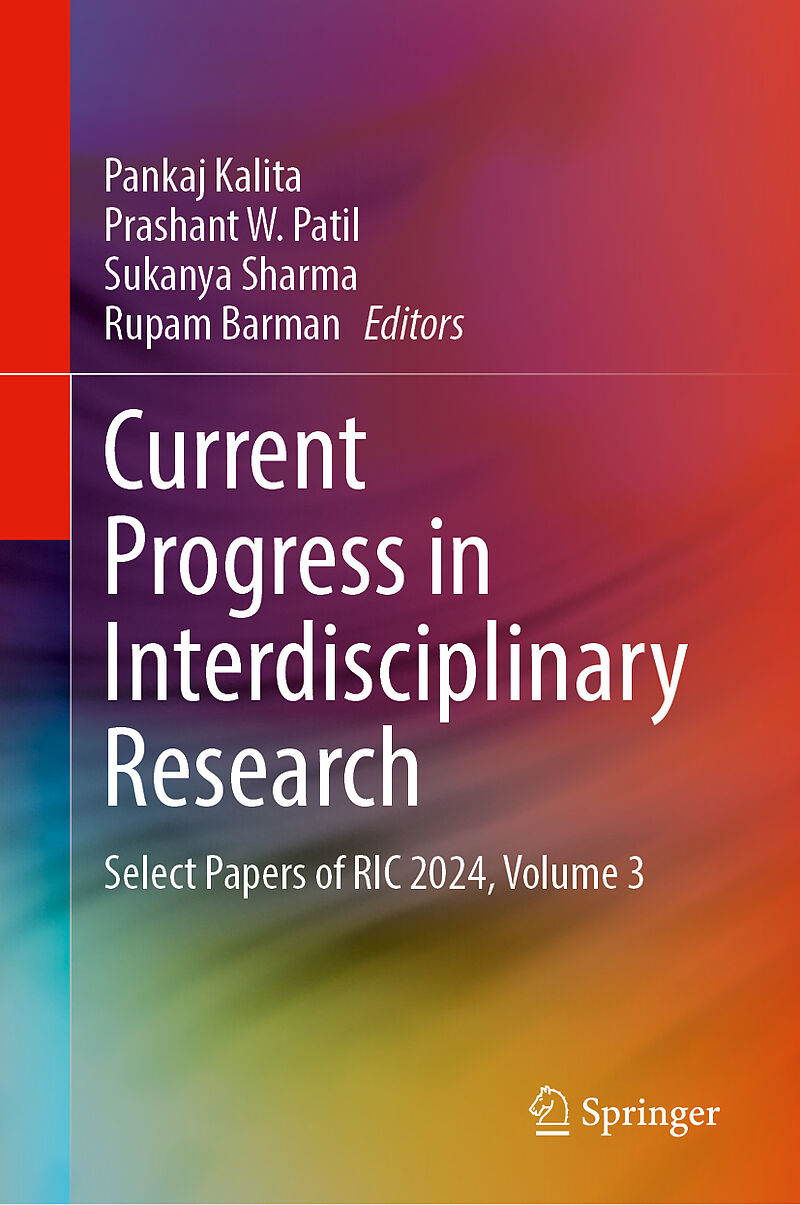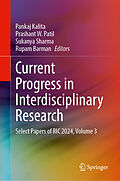

Current Progress in Interdisciplinary Research
Beschreibung
This book contains select, peer-reviewed articles presented in the 9th edition of Research and Industrial Conclave (RIC 2024), held at the Indian Institute of Technology (IIT) Guwahati, India, during 9th to 11th August, 2024. The compilation presents a divers...Format auswählen
- Fester EinbandCHF 280.20
Wird oft zusammen gekauft
Andere Kunden kauften auch
Beschreibung
This book contains select, peer-reviewed articles presented in the 9th edition of Research and Industrial Conclave (RIC 2024), held at the Indian Institute of Technology (IIT) Guwahati, India, during 9th to 11th August, 2024. The compilation presents a diverse selection of peer-reviewed research papers that highlight recent advances and interdisciplinary collaborations across key domains such as Energy Science, Artificial Intelligence, Mathematics, and Social Sciences. The included studies exemplify the integration of scientific inquiry with technological innovation, creative problem solving, and societal relevance.
Emphasizing the dynamic and evolving nature of interdisciplinary research, the proceedings underscore efforts to transcend conventional disciplinary boundaries and promote holistic, application driven approaches to addressing contemporary global challenges. This book serves as a comprehensive reference for academicians, researchers, industry practitioners, and innovators, offering insights into the convergence of fundamental science and practical application within a collaborative research ecosystem.
Autorentext
Pankaj Kalita is currently an Associate Professor in the School of Energy Science and Engineering, Indian Institute of Technology (IIT) Guwahati. He is a Mechanical Engineer by profession. He has completed his master and PhD degree from IIT Guwahati. He worked as Assistant Professor in the Department of Energy at Tezpur University, Assam before joining at IIT Guwahati in 2015. He has more than 13 years of teaching experience and two decades of research experience in the field of renewable energy. He has published more than 100 research articles in various reputed journals and conferences. He has co-edited several books. He has executed several research and consultancy projects in the areas of clean energy technologies. His current areas of research include biomass gasification, pyrolysis, anaerobic digestion, solar thermal and PV systems for cooling and heating, energy management, energy storage and integration of renewable energy for remote electrification.
Rupam Barman is currently a Professor at the Department of Mathematics, Indian Institute of Technology (IIT) Guwahati, Assam, India. He obtained his M.Sc. in Mathematics from IIT Delhi and Ph.D. from IIT Guwahati. After completing his Ph.D., he worked as a Postdoctoral Fellow at University of Heidelberg Germany in 2012. He worked as Assistant Professor in the Department of Mathematical Sciences at Tezpur University, Assam and in the Department of Mathematics, IIT Delhi before joining at IIT Guwahati in 2016. He has more than 20 years of teaching and more than a decade of research experience in the field of Number Theory and Algebra. He has published more than 70 research articles in various reputed journals. His areas of research interests include Algebraic Number Theory, Elliptic Curves, Iwasawa Theory, p-adic measures, Exponential Sums, Kloosterman Sums, Hypergeometric Functions over Finite Fields, p-adic Hypergeometric Series, Modular Forms, Theory of Partitions and the mathematics influenced by Ramanujan. Currently, he serves as an editorial board member of The Ramanujan Journal published by Springer Nature.
Prashant W. Patil is currently an Assistant Professor at the Mehta Family School of Data Science and Artificial Intelligence, Indian Institute of Technology (IIT) Guwahati, India. He earned his Bachelor of Engineering (B.E.) from Pune University (2014), M.Tech. from SRTM University (2017), and Ph.D. from IIT Ropar. He worked as a Research Fellow at the Applied Artificial Intelligence Institute, Deakin University, Australia. His research interests include Computer Vision, Image/Video Processing, Object Tracking, Multi-weather Restoration, Activity Recognition, Underwater Enhancement and Multi-modal Deepfake Detection.
Sukanya Sharma is currently Professor of Archaeology in the Department of Humanities and Social Sciences, Indian Institute of Technology (IIT) Guwahati. She completed her PhD from the Department of AIC and Archaeology, Deccan College Post Graduate and Research Institute, Pune. She joined IIT Guwahati in 2006 as Assistant Professor. Her research interests are multidisciplinary. She has published several books, as well as multiple research papers in national and international journals. She has designed the Virtual Anthropology Laboratory which has won awards in the e-learning category. Her successful experiments in the field of producing absolute dates from vintage pottery samples, mapping the development of the pottery craft of Assam from 2700 years before present till the present are some of her successful projects. Her current projects are in the areas of Cultural Heritage Management, Ancient Metallurgical traditions and Indigenous agriculture of Northeast India. She is serving as an editorial board member of Humanities & Social Sciences Communications a journal published by Springer Nature and Journal of Space and Culture, India.
Inhalt
Identification of Load Frequency Behavior for Allocation of Spinning Reserve on the Indian Grid.- Minimum Over-Supply Factor Needed for Grid-Scale Energy Storage System based on Unmet Electricity Demand in India.- Data-Driven Models for Predicting the State of Health of Lithium-ion batteries.- Life Cycle Assessment of a Building Integrated Semitransparent Photovoltaic Thermal system: Effect on Environment.- A Sustainable Approach to Passion Fruit Waste Utilisation: Statistical Optimization of Ultrasonic Extraction of Polyphenols.- Fuel cell technologies, their types and components: A panaromic review.- Comparative Performance Analysis of Darrieus-type Straight-Bladed Vertical Axis Wind Turbine using Conventional and J-Shaped Airfoils.- Experimental Investigation of Drying Cabinet of a Solar Dryer.- Thermal analysis of Calcium silicate brick wall with bio-composite PCM numerically in ANSYS software.- Coal Fine Beneficiation for Gas Production in Indian Context.- Understanding the citizens and the on-ground challenges of a Sustainable Smart City: A case of Guwahati city.- Designing a water heating system for Base of the Pyramid (BOP) community.- Scenario-Based Ideation Tool for Concept Detailing.- etc.
